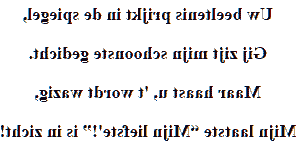Flemish love poem
De spiegel
Uw beeltenis prijkt in de spiegel,
Gij zijt mijn schoonste gedicht.
Maar haast u, 't wordt wazig,
Mijn laatste "Mijn liefste'!" is in zicht!


→ French poem ←
Flemish language
Flemish love poem, in a low-francique dialect for the reflection of the Flanders's girls. You must read, in the face, hair and eyes, of the Flemish girls (Flemings), all the translation of love.
Flemish (Flemish Dutch (Vlaams-Nederlands), Belgian Dutch (Belgisch-Nederland), Southern Dutch, Autonym : Vlaams) is a regional language based on Dutch, official in Belgium.
Vlaams is part of the Dutch language continuum. it is spoken in the northern half of Belgium and spoken in the northern half, by about 6 million people, that mean half population of Belgium.
Flemish is spoken in the so-called Flemish region, whose inhabitants are called Flemings, and who give the name of Vlaams to their language. It is also the most spoken dialect in the Netherlands (13 million people).
Like Dutch, Vlaams is a West Germanic language, historically very closely linked to Low German ... the further east you go, the closer the dialects are to Low German.
It is at least from the 13th century that we find the word "Flemish" to designate all the Dutch dialects spoken in Flanders.
Flemish cannot be regarded as a language distinct from Dutch; in fact in Holland as in Flanders in Belgium, one finds very many dialect variations of Dutch, which do not form distinct groups.
On the other hand, if we compare standard Dutch with standard Flemish, even if there is a possible mutual understanding, the differences are notable.
It should also be noted that as a whole, in Belgium or Holland, this important dialect variation of Dutch is disappearing due to a standardization that began in the 17th century in Holland and in the 19th century in Flanders.
It was precisely in Flanders in the 19th century that a written language was established, the hoog-vlaams (Flemish raised), which spread through the press and literature ... let's quote Henri Conscience.
... And with the aim To replace French as a language of culture, a whole propaganda deployed at the end of the 19th has generalized the use of Dutch.